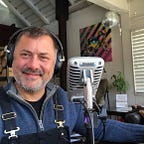Artists & Algorithms: Christine McLeavey Payne | GP Interview #23
This is the twenty-third in a series of interviews with explorers, thinkers, artists, activists and other luminaries around the world, people whose life’s work resonates with our founding principles.
Our friend Christine McLeavey Payne is a Member of the Technical Staff at OpenAI, where she recently published MuseNet and Jukebox. Christine studied physics at Princeton, and neuroscience and medicine at Stanford. She’s a trained classical pianist and concert musician.
Not one to shirk from healthy skepticism and speculation, Christine and I chatted about the present and future of AI and all of its myriad impacts on society and the workplace.
GP: You’ve spent the last few years using AI algorithms to generate novel music. You’re also trained as a classical pianist. Have algorithms learned to develop their own style? How might a real life human musician interact with a composing algorithm?
CMP: Models like MuseNet, Jukebox, and other AI music algorithms are still very much the early steps — they’re like students at conservatory who are learning how to imitate the great musicians of the past.
I love when MuseNet suggests a new and surprising way a Mozart sonata could have gone, or when Jukebox generates a sample that sounds like Ella…
